Rolling coronavirus coverage: Hefty new fine, permanent roadblocks introduced to deter Melburnians flocking to regional Victoria
A hefty new fine will be introduced to deter Melburnians from streaming into regional Victoria, with permanent roadblocks set up along the border of the metropolitan area. It comes as a new virus hot spot is identified at a major south-east shopping centre.
Coronavirus
Don't miss out on the headlines from Coronavirus. Followed categories will be added to My News.
This coronavirus article is unlocked and free to read in the interest of community health and safety. Get full digital access to trusted news from the Herald Sun and Leader for just $1 a week for the first 12 weeks.
Hefty new fines will be introduced for Melburnians trying to head into regional Victoria, while the state has recorded another 42 new cases of coronavirus overnight, with eight people succumbing to the deadly disease.
Six of the deaths occurered prior to Tuesday, and all the deaths are linked to aged care facilities and include four men and two women in their 80s, and two men in their 90s.
FINES, CHECKPOINTS INTRODUCED TO PROTECT REGIONAL VIC
A new $4957 fine will be issued to Melburnians who escape the city and travel to regional Victoria.
The new offence comes into effect from midnight on Wednesday as restrictions in regional and rural Victoria are eased.
Deputy Commissioner of Regional Operations Rick Nugent said the whopping fine is aimed at protecting regional Victorian from future COVID-19 outbreaks.
“We don’t want the virus to spread again in these areas,” he said.
The new offence will not apply to those visiting intimate partners in regional Victoria.
Police will strengthen its enforcement at vehicle checkpoints, holiday hotspots and transit hubs across the state.
Mr Nugent said more vehicles will be stopped at border checkpoints including all vehicles towing campervans, boats, jetskis, fishing gear or swags.
“There will be delays at these checkpoints and for that I am sorry but we have to do all we can to ensure people from metropolitan Melbourne don’t travel to these areas,” he said.
To date police have tried to “strike a balance” between checking as many cars as possible while keeping traffic delays at checkpoints below 15 minutes.
Mr Paterson said no additional officers will be deployed to checkpoint sites and delays will be longer.
“The amount of police will stay the same but what it will mean is a longer wait time but this is necessary,” he said.
Additional checkpoints will also be established along the Mornington Peninsula to deter holiday-makers and beach goers, especially during school holidays.
He said a semi-permanent checkpoint would be set up across several major roads into the Mornington Peninsula, despite the region being classified as metropolitan Melbourne.
Melburnians being caught on their way to the Peninsula will be fined the $1652 fine.
Mr Nugent said: “Additional enforcement will be supported by more pop-up and random checkpoints on backroads. The state highway patrol will be patrolling those backroads and will use automated number plate recognition to alert us to people from the metropolitan region.”
Transit hubs, including bus and rail depots in areas including Geelong, Ballarat and Bairnsdale, will also be patrolled by police to catch out rule breakers.
Regional and rural officers will be responsible for most of these patrols and will use their local knowledge to determine if anyone is out of place.
“I’ve asked them to be very active and ensure they are the protectors of their local community. Those local police will be patrolling the roads, checking vehicles, caravan parks, camping grounds and state parks and attending at boat ramps, pubs, clubs and bars,” Mr Nugent said.
Holiday accommodation operators are advised by police to reject bookings from people in the metropolitan area.
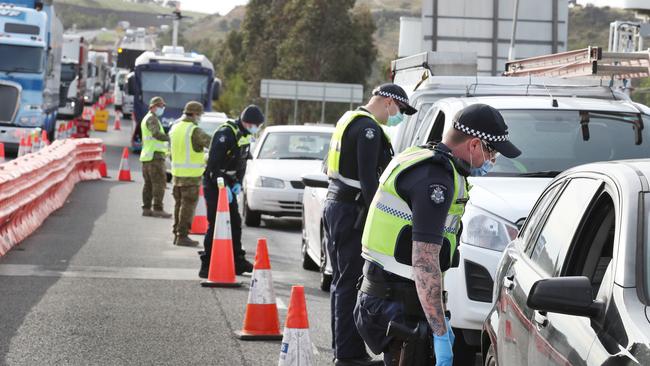
FOUNTAIN GATE IDENTIFIED AS HIGH-RISK LOCATION
Westfield Fountain Gate has been identified as a coronavirus hot spot, with a cluster emerging in the city’s south-east.
Anyone who visited the Narre Warren shopping centre between August 18 and September 6 is encouraged to watch out for symptoms.
Ms Mikakos said individuals were encouraged to be aware of outbreaks in their local community.
“We have been putting more and more data, including details of localised outbreaks, on the DHHS website and if there’s more information we can put in the Chief Health Officer’s media release,” she said.
Ms Mikakos highlighted an outbreak in the south-east of the city, with residents in the Casey are encouraged to get tested.
“Text messages have been sent out to Hallam residents this morning, encouraging them to be tested and we would encourage that community to take up the opportunity of three pop-up testing sites that have opened in the community in recent days,” she said.
Ms Mikakos highlighted the alert about Fountain Gate shopping centre in Narre Warren, and said it was important to strike a balance between informing but not scaring local residents.
“We wouldn’t want to cause undue concern or anxiety in that community but just to bring to people’s attention the fact that we have these local cases and we’re encouraging Hallam
locals to get tested if they have any concerns,” she said.
ACTIVE CASE MILESTONE REACHED
For the “first time in a long time”, there are fewer than 1000 active cases across the state, the Premier announced, with 991 cases currently active.
This includes 152 healthcare workers and 37 people in regional Victoria.
Of the total number of active cases, 497 are linked to aged care outbreaks.
There have been 14,374 tests processed in the last 24-hours.
“(It’s) maintaining a trend where we have lower numbers on the weekend and Wednesday, they jump,” Premier Daniel Andrews said.
There are currently 107 Victorians in hospital, with 11 in intensive care, six of which are on a ventilator.
Mr Andrews said the reopening of regional Victoria was a good sign the mechanisms in place were working.
“It is about optimism, rebuilding and setting up regional Victoria is quickly as we can improve positive to everybody in Melbourne that can get these numbers low and keep them alive and safely open up,” he said.
“By the end of the year, we have every chance that Christmas is as close to normal as possible.”
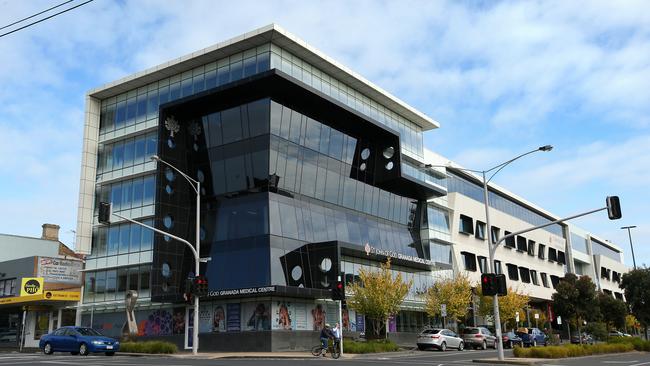
ELECTIVE SURGERY TO RESUME
Vital elective surgeries will return to Victorian hospitals from Thursday, with the Andrews Government unveiling its plan to tackle a backlog in operations created by the virus.
Health operators in regional Victoria will return to 75 per cent of normal surgery activity on Thursday and this will rise to 85 per cent on September 28.
Metropolitan Melbourne will move to the 75 per cent benchmark from September 28, providing the 14-day average drops between 30 and 50 cases.
Public and private hospitals in the city will not reach 85 per cent until they reach the next step in this process as expected at the end of October.
Surgeries will ramp up to full operations across the state if Victoria moves to the final stage of reopening on November 23.
It’s expected these changes will allow for an extra 18,750 elective surgeries in October and an extra 10,500 on top of this in November.
A blitz will resume as soon as possible to get more Victorians into theatres and tackle the backlog that has surged over the past three months.
Health minister Jenny Mikakos said there were approximately 60,000 Victorians on the surgery waitlist.
Dental services will also increase, with dentists in the city able to resume non-urgent procedures such as “routine examinations, temporary fillings, simple extractions and simple procedures like fluoride varnish and hand-scaling”, Ms Mikakos said.
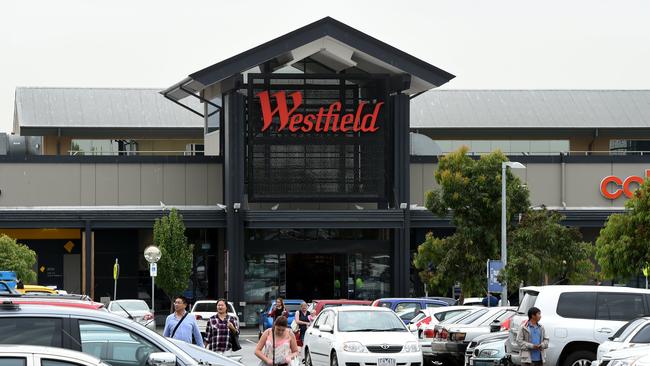
TOUGH REGIONAL ROADBLOCKS TO BE ENFORCED
Mr Andrews said there would be permanent roadblocks introduced between metropolitan Melbourne and regional Victoria.
He also foreshadowed new penalties may be enforced.
“We have to be determined and focus and my message to every single regional Victorian is we’re going to do everything we together can to make sure the virus is not travelling into regional Victoria from people who have no lawful reason to be in regional Victoria,” he said.
“There will be a time for travel. There will be a time for tourism to get back on its feet, Melbourne out into the regions and vice versa. That is not now,” Mr Andrews said.
Restrictions pertaining to camping across regional Victoria will also be relaxed, with some national parks to reopen.
The Premier also announced that regional Victorians free to travel across the rest of regional Victoria.
14-DAY CASE AVERAGE DROPS
It comes after no deaths were recorded on Tuesday.
Metropolitan Melbourne’s 14-day rolling average has now dipped below 50 and is now 49.6.
“The fact that we are in the 30 to 50 band (average cases) should be a point of pride, absolutely,” the Premier said.
“But we are making an assessment, not today, but in a short amount of time, about being in the 30 to 50 band and if we are ... for a significant period, then we’ll be able to make that call.”
Promisingly, mystery cases have also dropped slightly, with 81 in the metro region — a decrease of one — and one in regional Victoria.
Metropolitan Melbourne will be able to take its second step out of lockdown from September 28, if the region reaches an average daily case rate of 30 to 50 cases over a 14-day period.
Premier Daniel Andrews is expected to provide an update later on Wednesday.
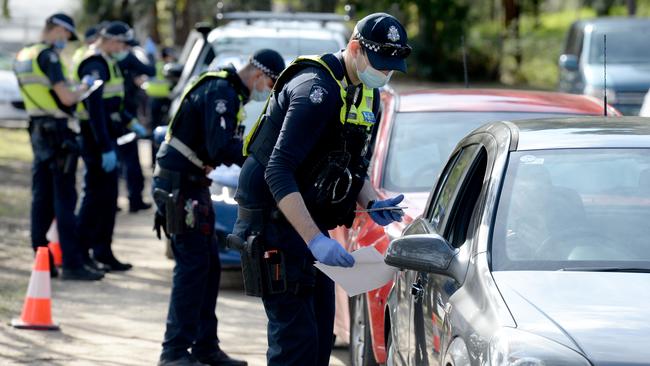
Meanwhile, more than a million Victorians will be able to travel, go to the pub and visit friends as regional cities and country towns are given the green light to open up.
From 11.59pm on Wednesday, restrictions on regional Victorians will eased to allow them to dine in at restaurants, cafes and pubs, and gather outdoors in groups of up to 10.
Masks will still be mandatory in regional Victoria, but there will be no restriction on leaving home for any reason, and community sport will return for all children.
The number of permitted attendees at weddings and funerals will also increase, and retail and beauty businesses can reopen.
In a boost ahead of the school holidays, intrastate travel will also be allowed, and tourist accommodation in regional Victoria will reopen.
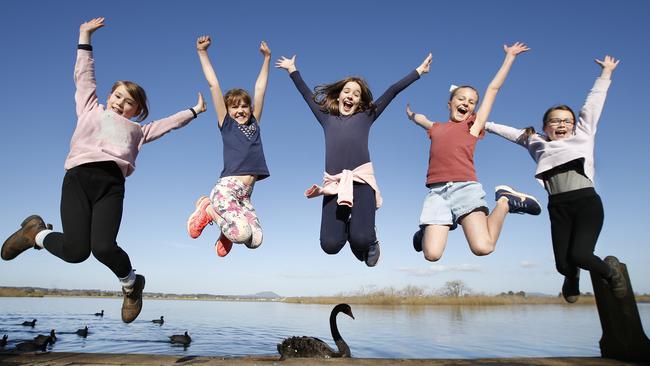
It comes as regional Victoria’s 14-day case average dropped to just 3.6 without any mystery infections in that time.
Premier Daniel Andrews will on Wednesday announce beefed-up measures to protect the regions and their near COVID-free status.
“This is a day of hope and optimism. This strategy is working,” the Premier said.
“It has worked in regional Victoria. It is working in metropolitan Melbourne.”
Beautician Chloe Irving said she was relieved to be reopening her salon, Boutique Beauty by Chloe, in Wendouree, Ballarat.
“I’ve had 17 missed calls in the past hour and so many emails,’’ Ms Irving said soon after the announcement was made.
“It’s exciting to be back from Thursday. We thought it was going to be Christmas but this is just so great. We’re very impressed.’’
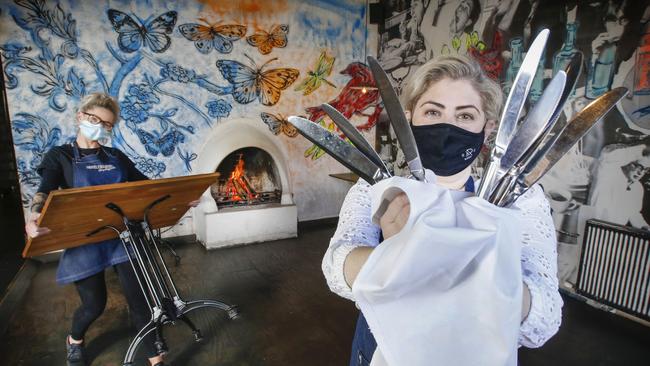
Abdel Bennani, general manager at Frangos Hotel in Daylesford, said he was glad to get the entire business back up and running again after the hotel and restaurant was forced to close but the cafe remained open.
Staff were meeting on Tuesday to plan their own road map to recovery.
“We’ll work it all out and do what we have to do,’’ said Mr Bennani, who also worked at one of the town’s other dining destinations, The Lake House.
The doors of the Halls Gap Hotel will be flung open again at 11.30am on Saturday after the enforced closure but with one eye on the weather.
Co-owner Mary-Anne Humphries said she and husband Matt were excited to be opening again but outdoor dining meant the fickle spring weather would be crucial.
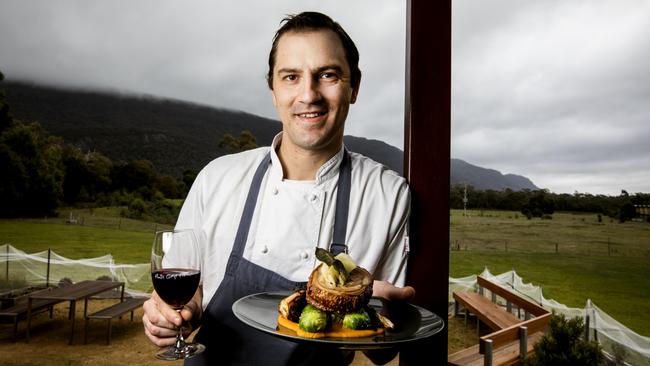
Deputy Chief Health Officer Professor Allen Cheng said the opening up of regional Victoria would be used as a “dry run” for what could happen in Melbourne.
“We’ll be making the same sort of assessment hopefully in a number of weeks to say that, you know, it’s safe for Melbourne to open up,” he said.
Mr Andrews said he was determined not to rush Melbourne out of lockdown, but the city’s 14-day average of 52.9 meant it was on track to reach the second step of reopening by September 28.
“We’re not going to be pressured into doing something that is fundamentally unsafe. We’re just not,” he said.
Federal Nationals MP Damian Drum, who represents Nicholls in the state’s northeast, said he feared people from metropolitan Melbourne would flock to country areas, compromising regional Victoria’s success.
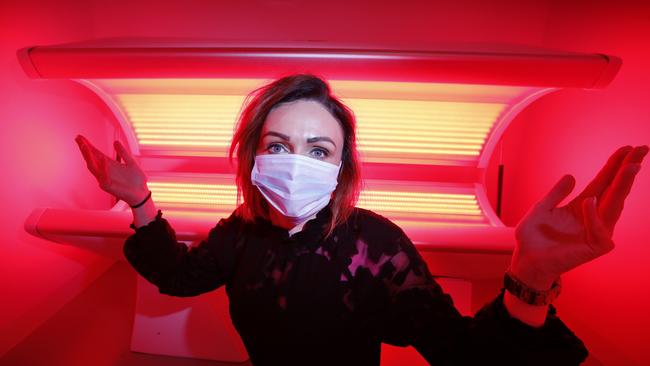
He has called for a border-style permit system to come into force, to enforce extra accountability on people leaving Melbourne.
“As we start opening up its going to be a lot more attractive for people from Melbourne to come here,” he said.
MP Tania Maxwell, member for Northern Victoria, said stringent checks on people travelling out of hot spot areas needed to be a priority to protect the regions.
But Mornington Peninsula Shire mayor Sam Hearn insisted his area should be classed as regional Victoria and allowed to reopen too.
“We need to be on the same footing as all the other areas that have the same characteristics as us,” he told 3AW.
“Whether that’s the Surf Coast, Bass Coast, Phillip Island, Geelong, the Bellarine. We’re the odd one out, really.”
ANDREWS WARNS VIRUS FIGHT IS NOT OVER
On Tuesday, Victoria recorded its first day in two months without a death linked to coronavirus, as Melbourne’s rolling average of daily cases continues to drop.
Premier Daniel Andrews welcomed the news but warned there were still COVID-19 patients who were gravely ill.
“There are many people still who are fighting this virus and it’s a very tough fight,” he said.
“I can’t guarantee that number holds tomorrow, but what we do know is that those numbers have been coming down and that’s a direct result of lots of different work and different efforts.
“It’s pleasing but I can’t pretend there will be no deaths tomorrow. It’s not a good thing to get, whether you’re frail and aged or healthy and young.”
The rolling daily average cases for Melbourne is now 52.9, with this figure now approaching the 30 to 50 case range needed for restrictions to be further eased on September 28.
CAR PARK NIGHT-LIFE PLAN A BID TO BOOST MELBOURNE CBD
Melbourne’s empty car parks could drive the city’s night-life revival under a plan floated from the peak industry body.
Parking Australia has called on the Andrews government to let multi-level car parks host outdoor culinary, arts and entertainment events, after news outdoor dining would be the first to reopen.
Chief executive Stuart Norman said their members had been hit hard by the pandemic and were looking at alternative “ways to use the available space”.
“Car parks could easily be used for outdoor dining – they possess key infrastructure like power (and) the space is highly ventilated,” Mr Norman said.
“We think it’s a wonderful, COVIDSafe way for people to come in and park, attend an event, eat food and see what they want to see in the arts.
“The possibilities are fairly endless.”
Mr Norman said the idea was also safer than the street dining proposal.
Event company The Big Group owner Bruce Keebaugh is on board, envisioning jazz bars and outdoor cinemas.
He said he had started a change.org petition with the hashtag #SaveVicEvents.
“We’re asking the government to give us an outdoor density quotient so we can plan,” he said.
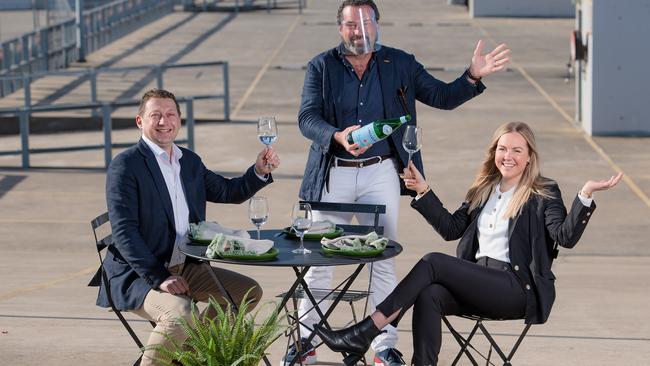
TRADIES GO HI-TECH TO SPOT FEVER
Hi-tech hard hats and vests will measure the temperature of workers for signs of fever, in a world-first trial to keep construction sites safe from coronavirus.
The study, run by Incolink and Deakin University, will use wearable sensors in safety gear to monitor temperatures across different parts of the body. If the technology detects signs of a fever, it will alert supervisors who can then follow up with testing.
Incolink chief executive Erik Locke said the scheme was the next step in keeping the construction industry running, with 85 per cent of workers tipped to be back on site by the end of the month.
“Even with the biggest program of onsite testing of any industry in the state, so far, we’ve had seven positive tests onsite, so this is an industry that is doing the right thing and getting results,” he said.
“We are looking at every possible innovation and technology solution to keep this industry working, which is critical to keeping the Victorian economy afloat.”
Industry Professor Tony Arnel is leading Deakin University’s research team for the trial and said personal sensors were even more accurate than infra-red cameras or thermometers.
“Since body temperature fluctuates throughout the day due to several factors and fever can come on at any time, wearable sensors will clearly provide better real-time data,” he said.
MORE NEWS
CAFE OWNER TO CHALLENGE MELBOURNE’S CURFEW
REGIONAL VICTORIA TO OPEN, MELBOURNE GETS HOPE
